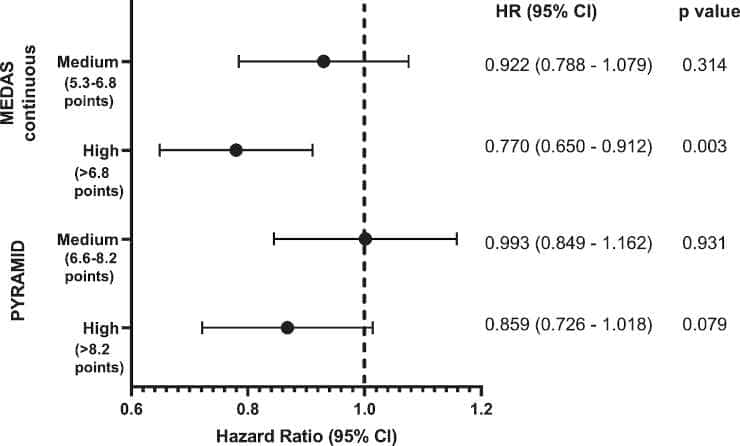A new study suggests that consuming a traditional Mediterranean-style diet may reduce the risk of dementia by nearly a quarter. Experts at Newcastle University found that people who ate a diet rich in foods such as seafood, fruit, and nuts had up to 23% lower risk for dementia compared to those who did not.
This is one of the largest studies of its kind, as previous research typically involved small sample sizes and a small number of dementia cases. Scientists analyzed dietary assessment data from 60,298 individuals from the UK Biobank, a large cohort comprised of individuals from across the UK.
The authors assigned a score to each participant based on how closely their diet matched the key characteristics of a Mediterranean diet. During the nearly decade-long follow-up of the participants, there were 882 cases of dementia.
Polygenic Risk
The authors evaluated each individual’s genetic risk for dementia by estimating their polygenic risk, a measure of all the different genes associated with dementia risk.
“Dementia impacts the lives of millions of individuals throughout the world, and there are currently limited options for treating this condition. Finding ways to reduce our risk of developing dementia is, therefore, a major priority for researchers and clinicians. Our study suggests that eating a more Mediterranean-like diet could be one strategy to help individuals lower their risk of dementia,”
said Dr. Oliver Shannon.
Together with Professor Emma Stevenson and Professor David Llewellyn, Shannon, Lecturer in Human Nutrition and Aging at Newcastle University, directed the study. Experts from the universities of Edinburgh, UEA, and Exeter were also involved in the investigation.
Good News

Credit: Shannon, O.M., Ranson, J.M., Gregory, S. et al. CC-BY
The authors discovered that there was no significant interaction between polygenic dementia risk and Mediterranean diet adherence. Even for those with a higher genetic risk, a better diet may reduce the likelihood of developing the condition, according to the researchers.
This finding did not hold up across all analyses, and the authors suggest that more research is needed to assess the interaction between diet and genetics on dementia risk.
“The good news from this study is that even for those with higher genetic risk, having a better diet reduced the likelihood of developing dementia,”
said professor John Mathers of Newcastle University.
Although more research is needed in this area, this reinforces the public health message that eating a more Mediterranean-style diet can help reduce our risk of dementia.
Limitations
The authors warn that their analysis is limited to individuals who self-reported their ethnic background as white, British, or Irish, as genetic data based on European ancestry was only available, and that more research in a variety of populations is needed to determine the potential benefit.
Based on their findings, they conclude that a Mediterranean diet rich in healthy plant-based foods may be an important intervention to include in future dementia prevention strategies.
This large population-based study’s findings highlight the long-term brain health benefits of eating a Mediterranean diet rich in whole grains, fruits, vegetables, and healthy fats.
“The protective effect of this diet against dementia was evident regardless of a person’s genetic risk, and so this is likely to be a beneficial lifestyle choice for people looking to make healthy dietary choices and reduce their risk of dementia. Future dementia prevention efforts could go beyond generic healthy diet advice and focus on supporting people to increase consumption of specific foods and nutrients that are essential for brain health,”
lead author Dr. Janice Ranson said.
Reference:
- Shannon, O.M., Ranson, J.M., Gregory, S. et al. Mediterranean diet adherence is associated with lower dementia risk, independent of genetic predisposition: findings from the UK Biobank prospective cohort study. BMC Med 21, 81 (2023).
